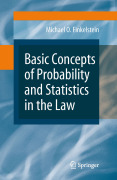
This book sets out basic statistical tools as they have been applied in actual legal disputes. Examples range over diverse fields of law, such as identification evidence, mass torts, securities law, environmental regulation, and capital punishment, among many others. In some notable cases, such as the U.S. Supreme Court’s decision in Bush v. Gore, the book explores aspects of the statistical evidence that were unrecognized or misconceived by the parties or the court. For the statistics student, the book will give a deeper appreciation of foundation concepts and provide a wealth of real life applications. For the lawyer, or law student, the book will introduce a subject that has become increasingly important both in litigation and in studies of the legal system. The book is self-contained and may be read without background in probability or statistics. Provides a basic introduction to concepts of probability and statisticsspecifically for lawyers INDICE: Probability.- Descriptive Tools.- Compound Events.- Significance.-Random Variables.- Confidence.- Power.- Sampling.- Epidemiology.- Combining the Evidence.- Regression Models.- Regression Models.- Regression Models - Further Considerations.
- ISBN: 978-0-387-87500-2
- Editorial: Springer
- Encuadernacion: Rústica
- Páginas: 250
- Fecha Publicación: 01/04/2009
- Nº Volúmenes: 1
- Idioma: Inglés
